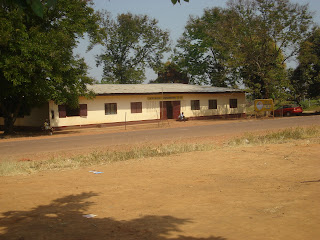After the Peer Educators Formation finished in September the work continued. Suprisingly, I expected work with the high school students that were formed to be rather easy, but they proved to be too busy with school work to really be motivated to continue the work. However, the peer educators that were formed from the community were all about going out and doing sensibilitzations. Throughout the months of October and November we did 4 sensibilizations in the quartiers and with the motorcycle drivers. These sensibilizations revolve around the issues of: early pregnancy, induced home abortions, contraception, and proper condom use. Here are two of the peer educators presenting the complications of abortion. Though our sensibilizations have taken a halt for now, we still get together once a week to simply talk, and the conversations that we have have taught me a lot about what it means to be a youth growing up in a Cameroonian village.
Here's a shot of Papa Iza and I on one of our excursions out into the bush. After a year of working side by side with him Papa Iza and I have a very good commraderie and really understand how to work together. During down time at the vaccination table, he's also taught me so much about this culture and the Muslim religion. I like to refer to him as my "Big Muslim Teddy Bear" (not to his face, as that probably wouldn't translate well). But the days we go out into the bush his alter-ego changes to "Bill Nye the Science Guy" because he wears these really great googles (to avoid the dust) straight from 6th grade science lab! I like to think that my alter-ego on bush days is the "Red Power Ranger" due to my super snazzy Peace Corps helmet.
A look at what vaccinations in the bush look like. We take the moto on a 40 km ride to a village, but on the way there are lots of little settlements that people have set up to work their farms. These people know the rendez-vous for when Papa Iza and I will be back, and they wait on the side of the road for us the last Sunday of each month.
For Thanksgiving this year, Danielle invited all the Adamaoua volunteers to her house in Meiganga. She managed to cook up a meal that tasted so much like an American Thanksgiving (thanks to care packages from her Mama in the States). Danielle also invited her Cameroonian family and closest friends, so it was really neat, to see their reaction to our traditions and to our traditional foods.
December 1st was International World Aids Day. To raise awareness I worked with the peer educators and a couple of the high school teachers to put together a small ceremony at the high school. It included a couple of sketches, games, and interviews. Here are a couple of the high school students dressed up as opportunistic infections and being interviewed by a journalist.
Dry season is here again! Which means DIRTY DIRTY feet, lots of more trips to the water pump (and much more frugality with water), outrageous boogers, and brick building time! During dry season, the men and boys in village work to construct mud bricks. They mix mud with water and put it in a plaster to take on the brick shape, and then let them dry in the dry heat and sun. Towards the end of dry season, these men will start building houses/shacks/or outdoor kitchens with them.
A morning at one of the local water pumps. (There are two water pumps that are available to the whole village, which is truly toooo little for a population of 7,000 people). Trips to the water pump mean being ready to: a) have a killer workout b) be aggressive about when it is your turn to pump. (If you help other people pump their bidongs you get a lot more say in when its your turn to put your bidongs underneath the spicket).
Women and children washing clothes and dishes at one of the local streams.
There was a pretty severe Meningitis outbreak in the North of Cameroon a couple of years ago. To avoid that happening again, the Cameroonian government funded a national campaign in 4 out of its 10 regions to vaccinate all people 1-29! (That is 70% of the population!) Our hospital in Dir was responsible for vaccinating 10,000 people (that includes the population in the surrounding bush villages). The whole staff at the hospital was busy busy busy for 11 days as we tried all sorts of strategies to get to all the people our health area was responsible for.
This included days at the primary schools, markets, soccer games, excursions out into the bush, and even going into the bars! Here a member of my vaccination team and I are getting our vaccination cards organized before vaccinating a first grade classroom.
The first grade classroom that we vaccinated! One single teacher with her 97 Students!!!!! Can you imagine?? WOOF. (Definitely a problem within the Cameroonian education system....)
One of my favorite things about this country is all the goodies that come as donations from Western countries. This means that every week at market there are just piles and piles of T-Shirts, dresses, hats, whatever to go through that you can buy at incredibly cheap prices. This also means that you will see people wearing absolutley RIDICULOUS things. Like a young 16 year old guy wearing a "World's Best Grandma" T-shirt. No joke. One day in village I ran into this little boy wearing a Santa hat! (First one I've ever seen in this country). I was so excited and thought I would take the opportunity to wish y'all a Very Merry Christmas. Hope its wonderful and full of love. On my part, my Mami and Pops are coming to spend the holidays with me, which is the best present I can imagine = )












































